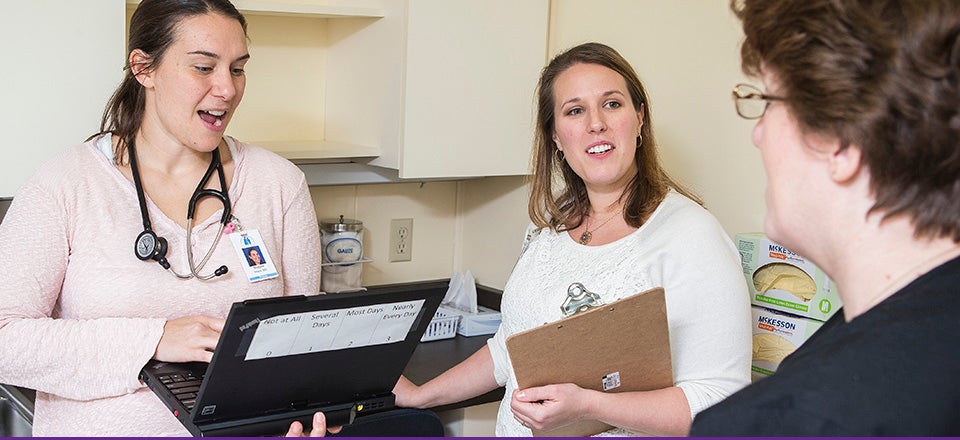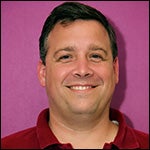SERVING WITH MINDS AND HEARTS
Health psychology grads poised to improve the lives of the underserved
Growing up on a military base, Jessica Ford witnessed the physical and psychological effects of war on her community.
As she watched service members and their families cope, Ford felt inspired to someday be a part of a health-care team that improved the overall health of individuals, one that could address the link between mental and physical health.
That dream is now a reality.
Ford will be awarded a doctoral degree on Dec. 19 in health psychology, along with 11 other graduates in East Carolina University’s degree program. Ford earned the degree in the clinical health psychology concentration; her cohort of seven students is the largest to complete the program to date. The class also includes five health psychology graduates in pediatric school psychology.
ECU’s health psychology Ph.D. in pediatric school psychology is one of only two such programs in the country (others are emerging as the field grows); the clinical health psychology program is one of just seven nationwide, said Susan McCammon, professor and chair of the Department of Psychology.
The accomplishments come at a critical time for North Carolina; a report prepared for the North Carolina General Assembly in 2013 revealed that the state is below the national rate of psychologists for its population. The report noted that because of its rate of population growth, North Carolina needs an additional 63 psychologists per year for the next five years to meet the needs of its citizens.
“Our dozen new graduates is a strong contribution toward meeting this number,” McCammon said. “There is a particular need for psychologists who can serve in rural areas, and who can provide services to people with chronic illness, to survivors of trauma and abuse, and to military personnel, veterans and their families.”
‘Service-oriented spirit’
Ford, who completed her degree in August, is part of a team in the Public Health Assessment Program at the Army Institute of Public Health, where she addresses behavioral health and social and community programs that relate to soldiers, their families and communities.
Ford wants to explore whether or not preventative public health programming ultimately reduces poor health behaviors and chronic disease—like heart disease—that are evident in military and veteran populations.
After listening to a lecture by ECU professor Sam Sears, director of doctoral studies in psychology, she was hooked.
“Dr. Sears gave an impassioned lecture about the great need for clinical psychology and behavioral intervention in medicine,” Ford said. “It was the culture and service-oriented spirit that convinced me that the clinical health psychology program at East Carolina was the perfect fit for me.”
It has been a perfect fit for others as well.
The clinical health psychology program saw its first class of students in 2007; the program’s vision is to be among the nation’s best programs in preparing and developing new generations of psychologists to help deal with complex medical issues including diabetes, obesity, heart disease and hypertension.
“I can say we have, without a doubt, accomplished our goal,” said Lesley Lutes, director of the clinical health psychology program.
The class is the largest graduating cohort to date, with a 100 percent placement rate for post-doctoral fellow or clinical faculty positions in higher education, Veterans Affairs, or medical facilities.
Pediatric School Psychology Concentration Graduates
- The third annual Pirate Entrepreneurship Challenge kicks off its three round competition on Tuesday, Oct. 15. This year’s challenge will feature more than $100,00 in awards. (Photo by ECU)
- Andy Gilicinski, global vice president for research development & engineering, SC Johnson & Son
Equally successful, the pediatric school psychology program is set to prepare students to help children get the treatment they need to succeed academically, behaviorally and emotionally, said Christy Walcott, director of that program.
“Our graduates have expertise in mental health, learning and behavior,” she said. “Our program is very unique in its emphasis on both health psychology and school psychology.”
Both programs are producing graduates who already are pursuing their passions not only for improving patients’ qualities of life and conducting research in the quickly growing field of health psychology. Even with other programs emerging at universities around the world, this semester’s graduates feel that ECU’s programs place them at an advantage.
“We stand out,” said Amaris Tippey, whose focus is also clinical health psychology. “What makes East Carolina stand out from other programs is that we make cutting-edge clinical and research endeavors available to individuals that are often living in rural and underserved areas that typically would not have access to cutting-edge care.”
‘Competitive in the national market’
ECU pediatric school psychology graduate Albee Ongsuco-Mendoza is an adjunct instructor in the Department of Behavioral and Social Sciences at Ivy Tech Community College in Bloomington, Indiana. Ongsuco-Mendoza enjoys teaching using real-world applications.
“I am eager to engage with students in the capacity of a research mentor by continuing my research on underserved rural and ethnic minority populations,” she said, “and involving undergraduate students in my work.”
Ongsuco-Mendoza said ECU’s program made it easy to find opportunities for clinical practicums because of partnerships with the East Carolina Heart Institute, the neonatal intensive care unit at Vidant Medical Center, Children’s Developmental Services Agency of Pitt County and Greene and Nash county school districts, among others.
“The clinical practicums that are available enable students to gain experience that make us competitive in the national market,” she said.
Ongsuco-Mendoza and the other graduates have come a long way as part of a young program that worked hard to give them the highest quality education while also working toward accreditation in both clinical health and pediatric school psychology by the American Psychological Association.
‘On the brink of change’
The graduates already are having an impact in Eastern North Carolina.
Julie Austen, who focused on pediatric school psychology, is in her post-doctoral year with Rural Health Group Inc., a non-profit community health clinic in Halifax County. She is a psychologist for the primary care office and works alongside a practitioner, case manager and community supports.
“We help enhance the quality of life for under-resourced adults and adolescents,” Austen said.
She hopes to influence other community health centers across the state to turn toward more integrated health care that addresses all areas of wellbeing.
“I feel well prepared to work with rural populations, making me especially prepared to work in eastern North Carolina,” she said.
Austen wants to be part of a transformation in public health.
“It is electrifying,” she said, “to be living in this moment when so much is on the brink of change, and health psychologists are being asked to contribute to that change.”
Others want to personally impact young lives.
Mili Lal is a school psychologist for New Hanover County Schools in Wilmington. For her, earning her PhD with a concentration in pediatric school psychology is just the beginning of a career she hopes will produce meaningful life improvements for children.
“The number of children with asthma, allergies, diabetes, obesity and other health conditions I encountered was steadily rising,” she said. “As the number of children presenting with chronic health conditions increases, it is necessary for pediatric care to expand so that it includes better collaboration among psychology, medicine, and other related disciplines.”
As these graduates move beyond East Carolina as their young careers unfold, program leaders tout their abilities to move seamlessly into specific roles within the field.
“The transformation from layperson to psychological professional is profound,” Sears said.
They also consider the trails they have blazed and what it means for future graduates in the field. “As PhDs in clinical psychology, the power of our graduates is exponential,” Ford said. “As we make a name for ourselves, our success will draw future bright stars to ECU.”
The Department of Psychology is housed in the Thomas Harriot College of Arts and Sciences.











